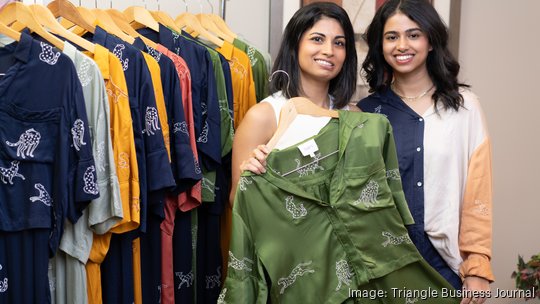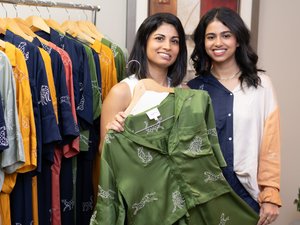
Salvation for a Raleigh fashion startup began with a viral TikTok video.
Raleigh entrepreneurs Niki and Rita Shamdasani launched Sani right before the pandemic, winning an early deal with Rent the Runway to be its first South Asian clothing brand. Clothes sold out in 48 hours, and optimism was high. Then came Covid-19.
“Our business went to not zero, but negative, because we were issuing returns,” Niki Shamdsani said.
As a last ditch effort to keep brand awareness alive, the sisters turned to TikTok. Their second video went viral, with 3 million views.
“What that led to was TikTok being the greatest growth driver for our business,” she said.
But TikTok, and the marketing strategies companies like Sani have relied on, is suddenly in danger, as Congress pushes a bill calling on TikTok's Chinese owners to sell the business over national security concerns — or face a potential ban in the U.S.
The Shamdasani sisters were among those gathered in Washington, trying to educate lawmakers on the impact the platform has had on small businesses across the United States. When they arrived, they were told about 12 House members planned to vote no on the bill. By the time the final tally was called Wednesday, the nays were 65, with 50 Democrats and 15 Republicans voting in opposition, not enough to sway the vote.
Shamdasani and others implored lawmakers directly, having been invited to do so by TikTok. Reception was mixed, she said. Shamdasani said many of the lawmakers talked about the bill as forcing a divestiture, shying away from the term “ban.”
“Very smart finance people agree that something for that size does not get done in that amount of time,” she said. “It’s not clear how it’s anything but a ban.”
The bill, if signed into law, would force TikTok owner ByteDance to either divest the app to a non-Chinese company within six months or face a TikTok ban in the U.S. The bill’s next stop is the Senate.
President Joe Biden has said he will sign the legislation if it passes.
170 million Americans use TikTok a fact lawmakers have said could provide the Chinese government with easy influence in the U.S.
Should the bill pass the Senate, there could be a buyer lined up, as former Treasury Secretary Steven Mnuchin is reportedly building an investor group to acquire TikTok.
According to PitchBook data, ByteDance was valued at $220 billion last year, though a price tag for TikTok alone isn’t clear. But as Shamdasani said, there could be complications for any sale, particularly amid a six-month window.
Reports indicate it’s unclear whether the Chinese government would allow ByteDance to sell TikTok to a buyer in the U.S. Any deal would require Chinese approval under export control rules, and last year its commerce ministry came out against a forced sale.
After the Wednesday vote, the Financial Times reported that China’s foreign ministry spokesperson Wang Wenbin said the U.S. had shown a “robber’s logic” toward the app.
“When you see other people’s good things, you must find ways to own them,” he said, according to the publication.
Niki Shamdasani said a TikTok ban would be devastating. She attributes many of the firm’s milestones to its use of the platform. Its biggest partnership yet came when, through an advisor, the firm sent a TikTok video to Peter Nordstrom, resulting in a deal with retail giant Nordstrom.
While Sani uses other apps, they’re primarily one-way conversations. With TikTok, Niki Shamdsani sees more engagement, and has used it to the brand’s benefit, such as when people asked for options outside of wedding-ware, a request that led to Sani’s expansion into lounge ware.
“It changed our product right off the bat,” she said of TikTok.
Shamdasani feels like entrepreneurs will find a way to push through, ban or no ban.
“As entrepreneurs, I think we always have to learn to adjust no matter what happens so we will adjust,” she said.
“There are several other steps, so I don’t think it’s over yet,” she said.

